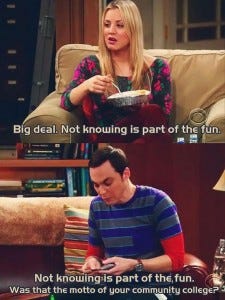When we think about climbing the career ladder, we likely worry about our technical skills. If we just learn that programming language, or dominate that user acquisition technique, we’d be able to earn that nice promotion. Turns out, technical skills are not the best predictor of career success anymore.

That’s a classic example of the legendary people skills of Sheldon Cooper, The Big Bang Theory’s cornerstone character. Although funny to spectators it must be tough to live with him. Much like what happened to the Top Gear host recently, his friends and coworkers probably wouldn’t have patience for him. Doesn’t really matter how smart or good at what he does he is.
Then we have someone like José Mourinho, and his approach to football coaching. This is a man who never played professional football, but is arguably one of the greatest football coaches of our time. How does he do it?
He is quoted to have said: “Football for me is a human science; it’s about man, above everything else.” He understands the importance of interpersonal skills, rooted in knowledge of psychology and leadership. “There are many ways to become a great manager,” he says. “But mostly I believe that the most difficult thing is to lead men with different cultures, brains and qualities. And I think to manage this is the most important thing.” He realizes he is leading individuals, each with with their own personalities and emotional styles.
Once, while at Inter, he noticed a player was exhausted and encouraged a holiday. “All the other coaches only spoke about training. He sent me to the beach. So I went to Ibiza for three days.”, the player said. “When I got back, I was prepared to kill and die for him.” Wouldn’t we all like to have Mourinho’s skills, or work for someone like that?
Throughout my university days, and lately at work, I’ve struggled with teamwork. I’m really stubborn and come off as negative because I challenge everything and don’t hold many reservations in sharing my doubts. That and the difficulty I have when trying to convey my ideas and vision to others. Those two together are definitely not a good combo as they can easily feed one another. And those are issues I’m aware of.
A recent issue I had was a wake up call that made me dig into a subject I never paid attention before: Emotional Intelligence.
So what is Emotional Intelligence?
Psychologists Peter Salovey and John Mayer (no not the singer :)) are regarded as the fathers of EI. They defined it as: “the ability to monitor one’s own and others’ feelings and emotions, to discriminate among them and to use this information to guide one’s thinking and actions.” in their 1990 article “Emotional Intelligence”. So it’s someone’s ability to navigate through emotions, colleagues’ or their own. Identifying how the person we talk to feels, interpreting and understand why, then reacting accordingly, comes easy to someone with high Emotional Intelligence. People with a high EI adapt to change easier, don’t succumb to stress easily, manage to maintain a good mood more often and are able to empathise with others. No wonder it’s so important for people in positions of leadership.
The field has roots in earlier works though, in one form or another. If we dig a bit into the Buddhist concept of mindfulness, for example, we’ll see just how far those roots go. Training the mind to be more sensitive to the body and the mind itself are part of that practice and are also key in Emotional Intelligence.
More recently Daniel Goleman and Richard Davidson are some of the people that are at the forefront of research into the subject. They are also doing us all a huge favor by bringing it closer to us dummies through their writing. I recommend the quick read “Training the Brain: Cultivating Emotional Intelligence” where they talk about the most recent findings, which can be really motivating to anyone that wants to work on their EI.
Just as Intellectual Intelligence is split up into various types, so Goleman sub-divides Emotional Intelligence into 5 domains:
1. Self-awareness: Knowledge of one’s internal states, preferences, resources, and intuitions;
2. Self-regulation: Management of one’s internal states, impulses, and resources;
3. Motivation: Emotional tendencies that guide or facilitate reaching goals;
4. Empathy: Awareness of others’ feelings, needs, and concerns;
5. Social skills: Adeptness at inducing desirable responses in others.
This helps to see that we can be good at some aspects of Emotional Intelligence and bad at others, just as it’s true in Intellectual Intelligence.
Why should we care about it?
According to a study on emotional intelligence at work, Emotional Intelligence determines the success of a company, with reports showing that a lack of it costs companies in the USA billions of dollars each year.
Emotionally intelligent people will boost the overall mood in the office. If someone is down it’s great when there’s a colleague they can talk to to make them feel better, or the leaders have a contagious positive attitude that spreads through the entire workplace.
On the opposite end, someone who has mood swings, or gets angry and sparks tension and disagreements, has an impact that can be devastating for the whole company.
Google finds this so valuable that, since 2008, they have a dedicated Emotional Intelligence course that their employees consider it to be a life changing experience. In “Search Inside Yourself”, Chade-Meng Tan, Google’s former engineer and now Chief Mindfullness Officer, makes a case for EI and the course he created.
It’s also meant to be a guide for people who can’t attend the course. As he says, it’s his little contribution to peace in the world.
Also, do you know who’s “officially” the happiest person alive? If you guessed a french molecular geneticist who became a Tibetan Buddhist monk, you guessed correctly.
Brain analysis show Matthieu Ricard’s brain waves are off the roof and tests show he literally can’t be upset.
So we have someone who went to Tibet as a regular PhD graduate and turned himself, at an adult age, into the happiest man in the world.
We’ll see later that his story is interesting because it shows Emotional Intelligence can be trained, and has been improved for millenia using a method we’ve all heard of.
What now?
In the next post we’ll talk about signs that show we might lack EQ, ways to identify what we need to work on and then discuss the underlying physical properties that influence our emotional intelligence, coming back to Ricard. We’ll cover brain plasticity, it’s formation during childhood and how it can be changed throughout our life.
People who follow Big Bang Theory should have noticed Sheldon Cooper is no longer the same Sheldon from the early seasons. He shows a noticeable improvement in the way he relates to his girlfriend, in his ability to notice when others are making fun of him or in emotional situations, such as the death of his friend’s mom.
In the third post we’ll talk about specific techniques we can use to improve, much like Ricard. We’ll talk about simple things we can do and pay attention to as well as the methods Google teaches their employees, as is shown in their book.
Cheers,
Zoran Vitez
Looking for your next challenge?






0 Comments